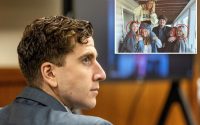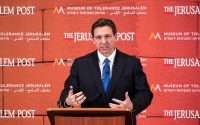Why Lori Lightfoot lost her Chicago mayoral reelection bid
Democratic Chicago Mayor Lori Lightfoot sensationally lost her re-election bid on Tuesday — becoming the first incumbent leader of the Windy City to miss out on a second term in 40 years.
Lightfoot made history when she became the first black woman and first openly gay person to be elected Chicago mayor back in 2019.
But her failure to handle a series of crises — including skyrocketing crime, the COVID-19 pandemic and battles with the powerful teacher and police unions — quickly sapped her support.
So what are the missteps that led to Lightfoot’s landslide re-election loss?
Skyrocketing crime
Under Lightfoot’s watch, there were more than 800 murders in the Windy City in 2021 — the most in a quarter-century. The homicide rate dropped 14% last year, but the total of 695 killings was still nearly 40% higher than it was in 2019 when Lightfoot took office.
The city also saw more than 20,000 cases of theft last year, nearly double the amount of similar incidents in 2021, Chicago Police Department data shows.

In the first three weeks of 2023, crime rates skyrocketed by 61% compared to the previous year.
In the lead-up to Tuesday’s election, polls showed that public safety was by far the top concern among Chicago residents.
But even as crime continued to increase, Lightfoot was accused of a lack of concern after she was caught on camera in January cheerfully dancing in the streets during a Lunar New Year parade.
Battle over schools
Lightfoot found herself embroiled in a fight with the powerful Chicago Teachers’ Union at the beginning of her term in 2019.
Teachers in the nation’s third-largest school district ended up going on strike for 11 days, which led to canceled classes for more than 300,000 students over a labor contract deal regarding pay raises.
Lightfoot eventually announced the district had reached a deal with the union after months of unsuccessful negotiations, which had led to marches and rallies across the city.

The mayor faced hot water again with the teachers’ union in early 2021 over her plans to reopen schools as the COVID-19 pandemic began to wane.
The union approved an agreement in February 2021 to reopen the city’s public schools to in-person learning after Lightfoot threatened to lock some educators out of remote learning software if they didn’t return.
Police union war
Lightfoot also went head to head with the city’s police union repeatedly during her tenure, most recently over her COVID-19 vaccine mandate for municipal workers.
Under the requirement introduced in 2021, all city employees were required to be either fully vaccinated or submit to testing through the end of that year.
The mandate was quickly slammed by the head of Chicago’s Fraternal Order of Police, John Catanzara, who had urged union members to defy the vaccine rules.
Lightfoot ended up taking Catanzara to court, where she successfully argued that his call for officers to ignore the vaccine mandate was illegal.
The judge granted the city’s request for a temporary injunction that barred Catanzara from making any public comments encouraging union members to disobey the vax mandate.

COVID-19 hypocrisy
In late 2020, Lightfoot was forced to defend herself after she popped up at a crowded victory party celebrating Joe Biden’s presidential election victory — just days before she enforced a stay-at-home order amid rising COVID-19 cases.
As part of her order, Lightfoot had asked residents to only leave their homes for work, school or essential needs because Chicago had reached a “critical point” in the outbreak.
But Lightfoot was quickly slammed over her hypocrisy after she posted footage of herself celebrating with fellow Democrats after Biden defeated Donald Trump.
As part of her defense, Lightfoot told MSNBC that everyone at the street party was wearing masks.
“I will tell you in that big crowd a week ago, everybody was wearing masks,” she said.
“Yes, there are times when we actually do need to have … relief and come together, and I felt like that was one of those times. That crowd was gathered whether I was there or not, but this has been a super hard year on everyone. Everyone feels traumatized.”


Neglecting ‘Magnificent Mile’
During the campaign, a number of business leaders accused Lightfoot of neglecting the city’s famous Michigan Avenue shopping district — known as the Magnificent Mile.
The posh strip has suffered from a string of looting incidents and a vacancy rate that has reached 30% — up from 5% vacancy in 2017, according to Crain’s.
A number of popular retailers have closed their doors or announced their departures from the downtown area in recent months, including Banana Republic, Old Navy, Timberland, Uniqlo, Gap and Macy’s.
Granting interviews only to reporters of color
Lightfoot, the first black woman to be mayor, sparked controversy in 2021 when she opted to only grant one-on-one interview requests to minority journalists.
Marking her second anniversary in office in May 2021, Lightfoot slammed the “overwhelming whiteness” of Chicago’s media and urged outlets to be “focused on diversity.”
She later defended the declaration, telling the New York Times that the number of non-white reporters covering her was “unacceptable.”
“I would absolutely do it again. I’m unapologetic about it because it spurred a very important conversation, a conversation that needed to happen, that should have happened a long time ago,” Lightfoot said at the time.


